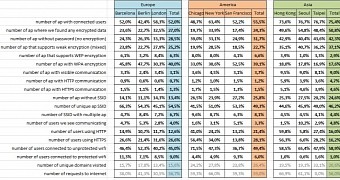An experiment conducted in nine large cities of the world revealed that the security of the hotspots in Europe is stronger than for those in the US and Asia.
The research relies on data collected in Chicago, New York, San Francisco, Berlin, Barcelona, London, Taipei, Hong Kong and Seoul.
Carried out by antivirus company Avast, it consisted in a volunteer walk through the metropolis carrying a laptop equipped with a WiFi adapter working in monitor mode. This way, it could pick up wireless information sent between an access point and a receiving client.
Europe seems to have more secure wireless networks
From the data collected, one could conclude that Europeans are more security aware when it comes to protecting their data and avoid connecting to open WiFi networks or leaving them open to the public.
Avast’s volunteers found that the percentage of access points without an authentication gate for its clients was 28.5% in Europe, 31.7% in the US and 42.3% in the Asian cities.
The stronger WPA (Wi-Fi Protected Access) protocol has been observed in 40% of the hotspots in Europe, 39.1% on the American continent and 17.6% in Asia.
On the other hand, as far as access points with HTTPS communication are concerned, the researchers found 1.3% in Europe, 1.5% in the US and 4.6% in Asia.
As per Avast’s study, it appears that more Americans (28.1%) rely on HTTPS in their browsing activities than Europeans (26.6%) and Asians (16.2%).
Results are not praising
Europe seems to be at the top when it comes to users connected to protected wireless networks, although it is leading with a non-flattering 9%, slightly ahead of America (6%) and far from Asia (1%).
Although the rank remained the same in the case of users connected to unprotected WiFi, the results are not favorable for any region: Europe - 45%, US - 49.4%, Asia - 58.9%.
The numbers in Avast’s study should be taken with a grain of salt as there are plenty of parameters that can influence the experiment, the area roamed by the volunteers and users’ browsing habits being just two of them.
For instance, the connection to websites protected by CloudFlare’s security services would be through HTTPS. Users in Asia may not have any use for these websites and prefer localized ones, which do not offer an encrypted connection. In this case, they are presented with the unencrypted variant.
Nevertheless, the experiment provides useful information about the overall security state of WiFi in different metropolitan areas on the globe, and it should ring the alarm about connecting to unprotected hotspots, as a large percentage of users have been observed to do so in all cities.

 14 DAY TRIAL //
14 DAY TRIAL //